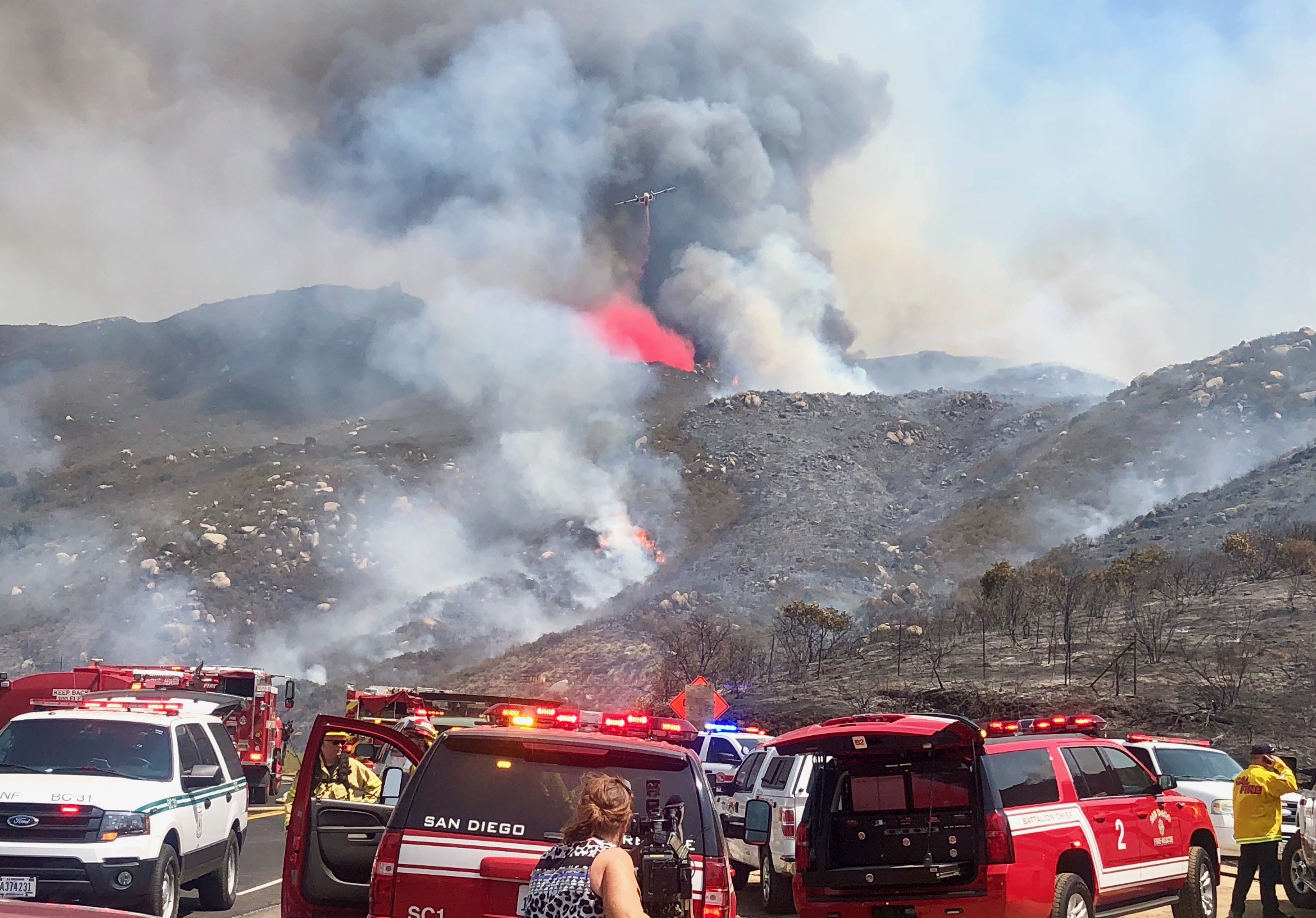Pet Disaster Preparedness Information

The Southern California region is especially prone to earthquakes and wildfires. Pet owners need to have an emergency plan in place, so they are prepared. Whether an emergency occurs because of an illness, wildfire, earthquake or other disaster in San Diego County, planning ahead is the key to keeping you and your animals safe.
Below are our top tips and facts to help you and your animals be ready.
1. Prepare an Emergency Kit. Put all of your daily pet supplies in a sturdy container. Gather a two-week supply of food, water and your pet’s medications. Don’t forget shot records, bowls, crates, bedding and toys. Keeping your pet comfortable will reduce stress during an evacuation.
Be ready to evacuate with your pet in the event of a disaster using the checklist below!
Put the following supplies in a sturdy, waterproof container:
- A 3-day (minimum) supply of pet food and water with bowls. If possible, we recommend having a 2-week supply on hand.
- A 2-week supply of your pet’s medications.
- Litter boxes with litter, if you have cats.
- Crates, bedding and toys.
- Extra leashes and collars.
- Vaccination and medical records.
- Make sure your pets are wearing collars with current identification. If they don’t have a tag, use a Sharpie to write their name and your contact information on their collar.
- Stickers you can attach to your pet’s tags with information about your intended destination and outside temporary contact information.
Keeping your pet comfortable will reduce stress during an evacuation. Remember, in case of a flood, fire, earthquake, hazardous spill or other disaster, your animals will rely on you to help them escape. The more prepared you are, the safer you and your pets will be!
2. Practice Transporting Your Pet. Make sure your pet is comfortable getting into a carrier and know where your pet hides when he is stressed and scared.
3. Plan for Large Animals. If you have large animals/livestock, have trailers or travel containers available for all of them. Practice with your animals in advance, so they are used to being loaded and unloaded from their trailers. Work with neighbors to identify locations where large animals can be brought to on foot (especially large open areas that can provide safe spaces during fires). You may not have time or space to evacuate all of your large animals, and you will not be allowed to reenter mandatory evacuation areas even for your own animals.
4. Identification. Make sure your pets are wearing identification at all times. This includes animals who don’t normally go outside. Collars with tags that have your phone number are important. Having your pet microchipped can also help identify them if they become lost. Make sure you keep your address and phone number up to date, in addition to listing an emergency contact outside of your immediate area.
5. Plan Ahead. Not all evacuation shelters accept pets, so it’s important to prepare. County information sources such as ReadySanDiego.org and ListoSanDiego.org (Spanish) can help. Research hotels outside your area for pet policies and ask friends or family if you and your pets can stay with them in case of disaster.
6. In Case of Illness. Create a care tree detailing how your pets will be cared for if you become sick or hospitalized. During a pandemic like COVID-19, have 2-4 options lined up in case additional people become sick.
7. Leave Early and Take Your Pets. If you are evacuating your home, take your pets with you. Pets cannot fend for themselves during disasters and leaving them behind can risk both their lives and those of rescuers. Leave early and don’t wait for mandatory evacuation orders.
8. In Case You're Away. A disaster may strike or an order to evacuate may come when you’re away from home. Make arrangements in advance with a trusted neighbor to take your pets and meet you at a specified location.
9. Learn Pet First Aid. The last thing you want is to be frazzled if your pet is injured. Spare yourself (and your pet) the panic by familiarizing yourself with what to do if your pet becomes injured.
10. Know Your Vet. Locate a veterinarian or animal hospital in the area where you may be seeking temporary shelter, in case your pet needs medical care. Be sure to add the contact information to your emergency kit.
In Case of Illness
Create a care tree for how your pets will be cared for should you become sick or hospitalized. Unlike a typical emergency, you need to have two to four backup plans as well!
- Reach out to friends, family, neighbors and pet-sitters who can care for your pets, if needed.
- Have two to four options lined up in case they become sick or hospitalized. Animal shelters are not the best option for your pets during a pandemic like COVID-19. They need the space to care for lost, injured or abandoned pets and they aren’t equipped to provide long-term care.
- Be sure to keep at least a two-week supply of pet food and water for your pets, as well as any medications they may need and a travel crate.
- Create a written emergency plan for each of your pets. Include your name and contact information, your pet’s feeding schedule, any medical conditions and treatment instructions. Document whether your pet is up to date on vaccinations, and list the contact information for your veterinarian. Lastly, provide three backup options of family or friends who can care for your pets, if needed.
Quick Resources:
Here are links to where you can find up-to-date information during an emergency:
Download Our Checklist
Published: January 1, 2023








